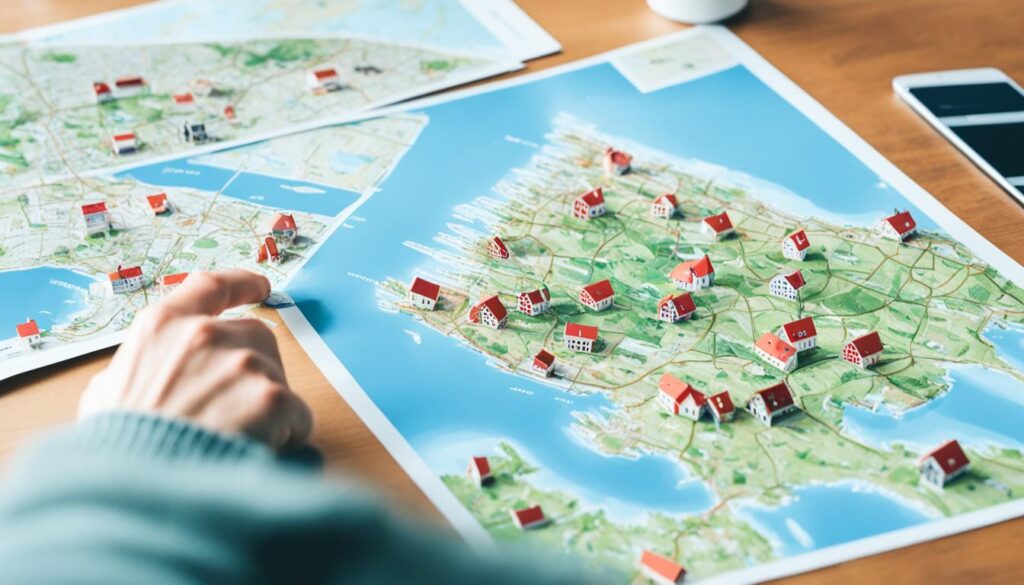As global interest in the Danish property market continues to rise, many wonder, “Can foreigners buy property in Denmark?” This guide aims to provide insightful answers for investors looking to explore foreign property ownership in Denmark. With its picturesque landscapes and strong economy, Denmark has become an attractive destination for expats and foreign nationals seeking to invest in Denmark real estate.
The process of acquiring real estate in Denmark involves a unique set of legal considerations that may differ from purchasing property in other countries. Generally, foreigners will need to meet specific criteria, such as obtaining special permissions from relevant authorities if they do not have a residency history in Denmark. For further details on the requirements, refer to the comprehensive guide here for a better understanding of the required permissions and documentations.
Key Takeaways
- Foreigners must meet residency requirements to invest in Denmark real estate.
- Legal restrictions may apply, especially for non-citizens.
- A Danish tax ID, known as a CPR number, is typically required for property transactions.
- Having a local bank account is advisable for foreign property buyers.
- For non-residents, the permission to buy property may take time to process.
- Different financing rules apply for foreign and local buyers.
Contact us if you are Interested in Buying Property Abroad!
Overview of the Danish Real Estate Market
The property market Denmark for expats showcases a unique blend of challenges and opportunities. In recent years, interest rates have significantly increased, moving from approximately 1% in 2022 to between 5% and 6% in 2023, influenced by unprecedented inflation and an energy crisis in the region1. Potential foreign buyers often face higher down payment requirements than Danish citizens, which may range from 10% to 15% or more due to increased scrutiny from banks regarding lending to non-citizens1. Current trends in Danish real estate signal a competitive environment, particularly for properties within the 1 to 3 million DKK price range, as many seek to invest in Denmark real estate despite the economic fluctuations1.
Interestingly, Denmark remains relatively affordable when compared to other major European cities. Average property prices per square meter are varied, with Copenhagen averaging between 35,000 DKK and 60,000 DKK, whereas cities like Aarhus and Odense present lower costs, with average prices at approximately 25,000 DKK to 45,000 DKK and 18,000 DKK to 35,000 DKK, respectively2. rental properties in Denmark also show promising gross rental yields typically between 2.9% and 5.6%2.
Impactful changes such as higher housing taxes, which will start for apartments in major cities in 2024, will affect the dynamics of the market. For expats, understanding the local regulations and the influence of banks, which may treat foreign buyers differently, can be crucial when considering a property purchase to navigate the challenges involved. Understanding the legal framework and securing proper financing options will be essential steps for those looking to thrive in the current market landscape.
Understanding Property Types in Denmark

When exploring types of properties in Denmark, potential buyers encounter a range of options within the vibrant Danish housing market. Key categories include residential and commercial properties, each offering unique characteristics and ownership structures.
The residential segment features various housing types, such as apartments, detached houses, and terraced houses. Among apartments, there are two main ownership formats: “ejer” (owner-occupied) and “andels” (cooperative housing). Ejer apartments offer full ownership rights, allowing for resale and renovation. In contrast, andels apartments require compliance with cooperative rules, often resulting in limitations on modifications and transfers.
Commercial properties primarily include office spaces, retail units, and industrial lots. Investors often consider these options for rental income or business operations. In addition, the Danish housing market has seen growing interest in sustainable living and co-living spaces, catering to evolving buyer expectations.
A further distinction exists between permanent and non-permanent dwellings. Permanent residences are suitable for year-round living, while non-permanent options, such as holiday homes, appeal to those seeking seasonal retreats. As the property landscape diversifies, potential investors can find numerous opportunities to capitalize on different property types in Denmark.
| Property Type | Characteristics | Ownership Rights |
|---|---|---|
| Owner-Occupied (Ejer) | Full ownership; freedom to renovate | Can be sold or transferred without constraints |
| Cooperative (Andels) | Shared ownership with cooperative rules | Limited resale options; typically requires board approval |
| Commercial Properties | Used for businesses; can be leased | Varies by agreements; profit-driven ownership |
| Holiday Homes | Seasonal use; may be permanently owned or rented | Dependent on local regulations; might require special permits |
Understanding these distinctions equips foreign investors with crucial insights, enabling informed decisions when navigating the Danish housing market. It is essential to grasp the nuances of each property type to maximize investment potential and ensure a successful purchase experience.
Foreign buyers should stay aware of these property types and their associated rights, enhancing their ability to make sound investment choices in the diverse market landscape of Denmark345.
Can Foreigners Buy Property In Denmark

Foreigners interested in buying land in Denmark as a foreigner must understand specific requirements set by Danish law. Generally, to acquire real estate, foreign nationals need either permanent residency or a minimum of five years of continuous residence in Denmark. This law, enacted by the Danish parliament in 1959, limits foreign persons’ access to real estate ownership6. If these conditions are not met, individuals must apply for permission from the Ministry of Justice, with the application needing to be submitted up to six months before the intended transfer6.
Requirements for Foreigners
The legalities of buying property in Denmark as a non-citizen can be complex. Foreigners who have not resided in Denmark for five years may seek special permission based on personal connections or intended use of the property. This is not an automatic process, as special permissions are rarely granted, especially for purchasing summer houses7. Non-residents must either be EU nationals working in Denmark or non-EU nationals holding valid residence or business permits7. For summer houses, a strong attachment to Denmark is necessary for permission to be considered7.
EU and EEA Citizens
EU and EEA citizens face fewer restrictions when buying property in Denmark. In many cases, they can purchase property without prior permissions if they have an employment or business presence in the country7. This accessibility simplifies the process significantly for EU residents compared to non-citizens, who encounter stricter regulations when acquiring any type of real estate8. Foreigners can consider establishing a company in Denmark as another viable route to get involved in the property market. Understanding these nuances is essential for potential buyers, particularly in vibrant cities like Copenhagen or Aarhus, known for their cultural and economic allure. Learn more about the conditions for purchasing property
Legal Framework for Buying Property

When considering the legal considerations for property buyers in Denmark, it is essential to understand the frameworks that govern real estate transactions. The Danish Purchase Act and the Rent Act delineate critical regulations that ensure transactions proceed smoothly while protecting both buyers and sellers. All Danish properties are registered in the Land Registry, identified by unique property numbers, contributing to a transparent and reliable system for property ownership and transfers9.
Aside from registration, information regarding land ownership, mortgage deeds, easements, and encumbrances is accessible online, enhancing the ease of conducting thorough due diligence9. Ownership rights in Denmark operate under a freehold system, enabling owners to freely dispose of, transfer, or rent out their properties. It’s crucial to register any real estate transfer with the Land Registry to maintain its validity against third parties9.
When examining understanding Danish real estate laws, it becomes apparent that consumers enjoy high protection standards. For example, real estate transactions demand mandatory building inspections, and sellers are required to offer partial insurance against hidden faults10. This protective framework is complemented by Danish landlord-tenant laws, which strongly favor tenants in residential settings while providing considerable negotiating flexibility in commercial leases9.
Municipal zoning plans, enacted under the Planning Act, play a pivotal role in property development regulations. Thesis guidelines ensure that any proposed developments comply with local standards, necessitating building permits based on approved local plans9. Foreign ownership is another critical aspect, as foreigners generally face restrictions in purchasing residential properties without permits confirming permanent residency or eligibility as EU citizens working in Denmark10.
Contact us if you are Interested in Buying Property Abroad!
Financing Your Property Purchase

Securing financing property in Denmark can be a smooth process for foreign buyers, provided they understand the different types of mortgages available. Foreigners typically face specific mortgage conditions that may differ from those of Danish citizens, with down payments commonly requiring between 10% to 15% of the purchase price8. Buyers are encouraged to engage with lenders who specialize in mortgages for foreign buyers, ensuring they receive tailored advice and suitable financing options to meet their needs.
Mortgages for Foreign Buyers
The mortgage landscape for foreign buyers in Denmark is structured to accommodate non-residents, yet the rules can be quite strict. Most banks finance up to 80% of the property’s value, meaning that buyers need to be prepared to cover the remaining portion. It is essential for potential homeowners to gather comprehensive financial documents to facilitate the application process. These documents often include proof of income, credit report, and any existing liabilities. Consulting with a financial advisor or a specialized mortgage broker can streamline the journey towards ownership.
Down Payments and Fees
Besides the initial down payment, prospective buyers should also consider various property buying costs in Denmark. These include transaction fees, notary services, and legal assistance8. The required fees associated with property purchases can add up; therefore, it is advisable to budget for these expenses accordingly:
| Type of Fee | Estimated Cost |
|---|---|
| Property Tax | 1.6% of purchase price |
| Real Estate Agent Fees | 1.5% to 2% of purchase price |
| Notary Fees | 0.5% to 1% of purchase price |
| Legal Fees | 5,000 to 10,000 DKK |
Understanding and planning for these financial responsibilities is crucial for foreign buyers looking to navigate the Danish real estate market successfully. Seeking expert advice from legal professionals and real estate agents can ensure clarity and a smoother transaction process. Consulting a specialized lawyer not only guarantees legal security but also empowers buyers with knowledge, aiding them throughout their journey toward property ownership.
Steps Involved in the Property Purchase Process

Buying a home in Denmark as a foreigner involves several key steps that ensure compliance with local laws and market practices. First, it is essential to search for a property that meets your needs. This includes comparing listings and considering various neighborhoods. Engaging with local real estate agencies can provide valuable insights into the property market.
After identifying a suitable property, the next step is to sign preliminary agreements. This stage often requires a written memorandum of understanding, outlining the essential terms of the sale. It’s important to consult legal professionals to ensure that the agreements align with the regulations outlined in the property purchase process Denmark. This can help avoid complications in subsequent steps.
Conducting due diligence is crucial before finalizing your purchase. Inspecting the property and verifying ownership records can safeguard your investment. For example, it’s vital to check if there are any outstanding taxes or encumbrances on the property. Remember, foreigners buying property must obtain permission from the Department of Civil Affairs, which typically takes around four weeks to process11.
Finalizing the purchase through legal contracts marks the conclusion of the process. Engaging with a lawyer experienced in the Danish real estate market will ensure that all legal obligations are fulfilled, including handling fees associated with property taxes, land tax, and real estate agent commissions. Foreign buyers should be aware of higher down payment requirements, which may be more than 10% or even 15% of the property’s value1.
In sum, being aware of these steps for foreign buyers can significantly enhance your experience in the competitive Danish real estate market. As you navigate these stages, it is advisable to consult real estate lawyers and financial advisors who can provide tailored assistance throughout the property purchase process Denmark.
Finding the Right Property in Denmark

Embarking on a property search in Denmark can be both exciting and daunting. With numerous avenues available, potential buyers need to explore various resources to effectively navigate the real estate landscape. Utilizing established real estate agencies in Denmark and online property portals stands as one of the most efficient methods for finding homes in Denmark. Many of these services feature comprehensive listings that can cater to diverse preferences.
Real Estate Agencies and Online Portals
Real estate agencies in Denmark provide invaluable expertise in the local market, often offering tailored services that simplify the search process. They can assist buyers in interpreting regulations and navigating legal considerations, ensuring a smooth transaction. Additionally, online property portals feature extensive databases, presenting listings from various regions, thus allowing users to filter properties based on their specific requirements. Websites like Boliga and DBA are popular for promoting listings while showcasing market trends.
Local Auctions and Advertisements
Participating in local property auctions can be another exciting avenue for finding homes in Denmark. Buyers can discover unique properties often at competitive prices. Additionally, keep an eye on local advertisements that may feature exclusive listings not found elsewhere. Utilizing community boards and local social media groups can further enhance your search, as these platforms often present opportunities and leads that traditional channels might miss. Understanding the specific laws impacting non-Danes is crucial when approaching auctions and transactions, as some regulations affect eligibility. Always stay informed and conduct proactive research as Denmark’s real estate market continuously evolves.
For those unfamiliar with driving regulations in Denmark, it is advisable to check the requirements for driving with a foreign license, which can impact several factors when relocating. More details can be found in this informative resource12.
Residency Requirements and Legal Considerations
When considering property ownership in Denmark, understanding the residency requirements for foreign buyers is essential. Generally, non-EU/EEA citizens must secure a residence permit before purchasing real estate, whereas EU/EEA citizens often do not need such permits under specific employment or residency conditions12. Individuals with strong ties to Denmark, such as extensive holiday stays or family connections, might also gain approval to buy a non-permanent dwelling11.
Legal aspects play a significant role in property transactions in Denmark. One critical requirement is to register real estate rights in the Danish land register, which provides protection against third-party claims13. Buyers should also be aware that Danish law requires completing the purchase within three years after receiving permission, if applicable11. This process not only highlights the necessity of a registered domicile but also implies that those leaving a permanent dwelling vacant for over six months may face potential fines11.
To ensure a smooth transaction, it is advisable for buyers to engage legal assistance familiar with local laws, as various factors such as zoning regulations and property taxes need consideration13 . Moreover, the implications of residency on property rights must be thoroughly understood, as navigating through these legal considerations for property ownership in Denmark can mitigate risks and foster successful investments in this appealing real estate market.
Contact us if you are Interested in Buying Property Abroad!
FAQ
Can foreigners buy property in Denmark?
What are the current trends in the Danish real estate market?
What types of properties are available for foreigners in Denmark?
Are there different requirements for EU and EEA citizens when purchasing property?
What is the legal framework governing property purchases in Denmark?
How can foreigners finance their property purchases in Denmark?
What steps should foreigners follow in the property purchase process?
How can I find the right property in Denmark?
What are the residency requirements for owning property in Denmark?
Source Links
- https://marioscian.medium.com/buying-an-apartment-in-denmark-as-a-foreigner-all-you-need-to-know-b66a9876a13
- https://investropa.com/blogs/news/denmark-real-estate-foreigner
- https://wise.com/gb/blog/buying-property-in-denmark
- https://www.expatfocus.com/denmark/guide/denmark-buying-property
- https://www.lunar.app/en/personal/blog/internationals/how-to-buy-real-property-in-denmark
- https://bremeradvokater.dk/en/arkiver/artikler/when-is-it-possible-to-acquire-real-estate-in-denmark
- https://wise.com/gb/blog/how-to-buy-danish-summer-house
- https://www.njordlaw.com/real-estate-and-construction-law/real-estate-denmark
- https://www.carstedrosenberg.com/danish-real-estate-law
- https://nordialaw.com/one-minute-guide-to-danish-law/
- https://lawyersdenmark.com/buy-a-property-in-denmark/
- https://cheapavailablecottages.com/your-guide-to-buying-property-in-denmark-as-a-foreigner/
- https://www.lexology.com/library/detail.aspx?g=e36f3f76-69d3-4c14-9a45-64f921cfb494

Comments